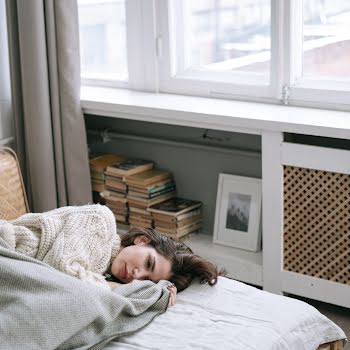By Nathalie Marquez Courtney
22nd Jun 2024
22nd Jun 2024
From incontinence to sexual discomfort, the majority of women will experience an issue with their pelvic floor, so why skirt around the subject? Get better acquainted with your body and take control.
A whopping 50% of women will experience pelvic floor issues at some point in their lives, and yet pelvic floor health is a topic we see covered all too rarely. Problems can range from leaking urine when coughing, sneezing or laughing, right through to discomfort during sex and even pelvic organ prolapse (when one or more of the organs in the pelvis slip down from their normal position and bulge into the vagina), which, needless to say, can cause a lot of pain and discomfort.
Your pelvic floor muscles are like a hammock running from your tailbone to your pubic bone. “They have a very important function – to support the pelvic organs (bladder, vagina/ uterus and bowel) and they are also important for sexual function,” explains physiotherapist Aoife Harvey from Women’s Health Dublin. “In younger women, they are generally very strong but that can weaken during pregnancy or after significant weight gain. They can also weaken with age, including during and after menopause.”
“In France, women who have delivered a baby get ten free physical therapy sessions to help ‘re-educate’ their pelvic floor.”
Experts like Aoife recommend doing pelvic floor exercises daily. We hear a lot about “the squeeze”, but she stresses the importance of strengthening and relaxing. “To ensure they support the organs, they need to stay strong; but if they are too tense, they can cause pain during sex and make it difficult to empty the bowel and bladder. So it’s also about the release.”
Irish Instagrammer Caoímhe Cummins usually shares interiors and lifestyle content with her 113,000 followers through @thebighillhouse, but was compelled to share a more personal story after a frightening GP misdiagnosis. “It took me two months to build up the courage to talk about it – it’s a scary thing putting yourself out there on social media about such a personal issue,” she says. “But I knew there would be thousands of women just like me. I have a predominately female following; the majority are mums and I wanted to use my platform to make them aware that they should go and see a women’s health physio, whether they have given birth or not.” Seeing a women’s health physio isn’t common here – but should be. In France, women who have delivered a baby get ten free physical therapy sessions to help “re-educate” their pelvic floor, so it’s clear some health systems are aware of just how important an issue this is. The reel Caoímhe shared on Instagram received almost 100,000 views, and a subsequent poll she conducted amongst her followers showed that over 300 women had made an appointment with a women’s health physio as a result of her posts. Her other piece of advice? “Do your pelvic floor exercises every day. They really do help.”

THE TOOL
The award-winning Elvie is a pelvic floor trainer that can make it easy and, dare I say it, fun to do your exercises. It uses Bluetooth to connect to an app on your phone, which then guides you through a series of five-minute gamified workouts. Elvie Trainer, €199.99 at Boots
THE APP
Finding pelvic floor support doesn’t have to be pricey. Squeezy has been reviewed and approved by the NHS, boasts a clear, simple interface and comes pre-loaded with recommended exercise plans developed by a pelvic floor health specialist. €2.99, squeezyapp.com
THE UNDERWEAR
The chances of developing urinary incontinence of some kind increase greatly with pregnancy, childbirth and menopause. Knix produces comfy and pretty undies in a range of styles that can absorb up to three teaspoons of liquid. From around €18, knix.com
THE PROGRAMME
Developed with healthcare professionals, Every Mother offers online exercise programmes tailored to a variety of life stages and issues – from sexual health and postpartum to incontinence and surgical recovery. From around €9 per month, every-mother.com
This article originally appeared in the Winter issue of IMAGE Magazine. Have you thought about becoming an IMAGE subscriber? Our Print & Digital subscribers receive all four issues of IMAGE Magazine and two issues of IMAGE Interiors directly to their door along with access to all premium content on IMAGE.ie and a gorgeous welcome gift worth €60 from The Handmade Soap Company. Visit here to find out more about our IMAGE subscription packages.























